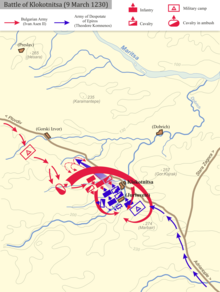Battle of Klokotnitsa
| Battle of Klokotnitsa | |||||||
|---|---|---|---|---|---|---|---|
| Part of the Byzantine-Bulgarian Wars | |||||||
 |
|||||||
|
|||||||
| Belligerents | |||||||
|
|
Empire of Thessalonica | ||||||
| Commanders and leaders | |||||||
| Ivan Asen II | Theodore Komnenos Doukas (POW) | ||||||
| Strength | |||||||
| unknown | unknown ("large army") | ||||||
| Casualties and losses | |||||||
| Light | Almost the whole army was killed or captured | ||||||
The Battle of Klokotnitsa (Bulgarian: Битката при Клокотница, Bitkata pri Klokotnitsa) occurred on 9 March 1230 near the village of Klokotnitsa (today in Haskovo Province, Bulgaria). As a result, the Second Bulgarian Empire emerged once again as the most powerful state in South-Eastern Europe and the power of the Empire of Thessalonica faded.
Around 1221–1222 the Bulgarian Emperor Ivan Asen II made an alliance with Theodore Komnenos Doukas, the ruler of Epirus. Secured by the treaty, Theodore managed to conquer Thessalonica from the Latin Empire, as well as Bulgarian lands in Macedonia including Ohrid, and establish the Empire of Thessalonica. After the death of the Latin emperor Robert of Courtenay in 1228, Ivan Asen II was considered the most probable choice for regent of Baldwin II. Theodore thought that Bulgaria was the only obstacle left on his way to Constantinople and in the beginning of March 1230 he invaded the country, breaking the peace treaty and without a declaration of war.
Theodore Komnenos summoned an enormous army including western mercenaries. He was so confident for his victory that he took the whole royal court with himself including his wife and children. His army moved slowly and plundered the villages on its way. When the Bulgarian tsar learned that the state was invaded, he gathered a small army of a few thousand men and quickly marched southwards. In four days the Bulgarians covered a distance three times longer than Theodore's army in a week.
...
Wikipedia
